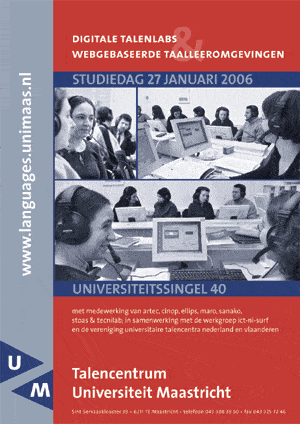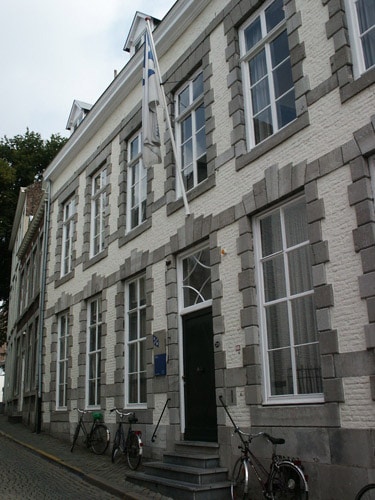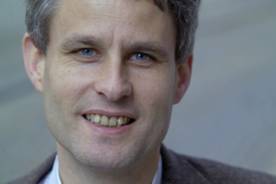In June 2007 I left my job after eight years as director of the Language Centre. It is nice to read again the interview given in my final week, looking back on those years and the educational policies of the Language Centre.
What did you set out to do as director?
Language training is a fine mission in a university as internationally oriented as UM. You cannot graduate in languages at UM, but you can take many subsidiary language courses during the course of your studies. Almost all students do so. Our system allows students to study in a language other than their native language: English as well as Dutch. Not many universities provide you with that opportunity. It is wonderful to see so many hesitant students progress to having several working languages at the end of their study. Some of them stay with Dutch and English, others have no problem with three languages, because they come from a different country or have spent some time abroad. I have even met students who are fluent in four or five languages; something I get very enthusiastic about as a linguist.
Looking back on the past eight years, I think we have done a lot to support students and employees of the university. We have raised the profile of language training and laid the foundation for good-quality education, built a competent teaching team, put bilingualism on the management agenda and given Dutch the place it deserves. After much opposition we finally managed to implement English certification for staff and students and professionalize support in the area of translation and editing services. However, in my professional opinion, I can say there is still a lot more to be done if you want to be a European university and establish yourself in the field of languages too. Isn’t that what we want? Now that I am leaving, however, I realise that what we have achieved is very fragile. It makes you think.
What do you think of UM’s bilingualism?
Many students underestimate the difficulty of studying in a different language. They think it’s easy until they have to write their first research paper; then they panic and hopefully knuckle down to some real work, and make an important discovery: perfect bilingualism does not exist. At that point they can start to develop their skills and change their attitude. It is all about knowing what you are good at and what you need to work at, finding the right tools (good books, particular websites, a study archive you have built yourself) and when to seek help from others. I sometimes see application letters written by students that are full of mistakes. Those students obviously have no idea what their strengths and weaknesses are and do not feel the need to have such important letters read by someone else. There are students who do have that insight and are very professional in their use of language. That is an academic skill that is required in almost any profession. Multilingualism is a learning process and a realization process. It is a long process, but very rewarding. It makes you professionally more versatile, gives you increased cultural awareness, and broadens your academic and social horizons. It is wonderful to be able to provide your students with such opportunities; that is what makes Maastricht special.

Does the university live up to bilingualism?
The university has had an official policy of bilingualism since 1996, which is still being developed. The topic is very much in the minds of students. Many students are attracted by it, or mention it at the end of their studies as one of the most formative aspects. It is in the minds of the staff as well. Multilingualism is important on all levels: from general and technical support to policy development, from porters and switchboard operators to communications officers and lawyers, from student assistants to professors. The fact that the unions have made resources available this year for language training, whereas the Executive Board is cutting back, is very significant.
I believe that the importance of academic multilingualism has not yet been taken on board at academic staff and management level. Lecturers often underestimate the effort and extra time involved in foreign language education. They prefer putting their energy into research. Management does not always realise that the extra effort and time must be rewarded and that it requires, and will continue to require, specific support. If you have a multilingual education system, you must invest in it, otherwise you will continue to muddle along and achieve only average results. This is not just a question of organizing one-off crash courses and exams, but of creating and maintaining an infrastructure.
Our university is very ambitious and has so many different objectives: internationalization, small-scale Problem-Based Learning, being in the European elite, talent scholarships and attracting top research. All these objectives have their price. You cannot give extra funds to everything and you cannot excel in everything either. In my opinion, multilingualism and language training are in danger of falling victim to this. Other objectives take precedence over languages. As a Language Centre you are at the hub and on the side-line of the educational process at the same time. Language training is often the target of condescending remarks like: It is not very academic, is it? Can’t students do it themselves? Shouldn’t they have learned that at secondary school? That shouldn’t be very expensive, should it?
What will you be doing in your new job?
I will be starting two new jobs. I will be Study Secretary for a catholic NGO in Tilburg for three days a week, where I will be working on publications in the area of spirituality, teaching formation courses and supporting management. It is an interesting and dynamic job with lots of challenges. I will be working for the Netherlands as well as for countries with young religious provinces, such as Indonesia, Brazil and Kenya. Of course, I will also need to do work in Italy and France. In that way I can continue using my languages. In addition, I will continue to work one or two days a week for Maastricht University as lecturer in European Studies, teaching and supervising final works. I am very happy with that. I am a teacher and a European in heart and soul. I have become very attached to UM after all these years. We have an excellent educational system and great students from so many countries and so many different languages on campus. I really hope it stays that way!
Interview published on the website of Maastricht University Laguage Centre, 2007.



